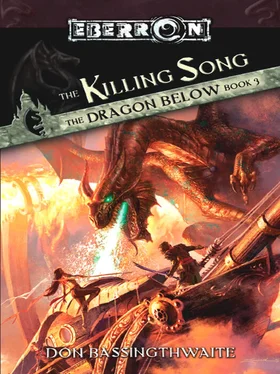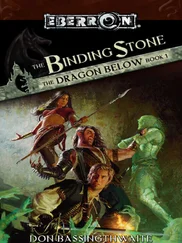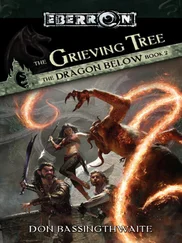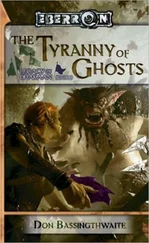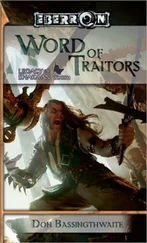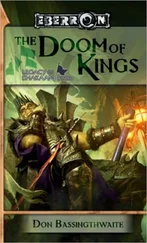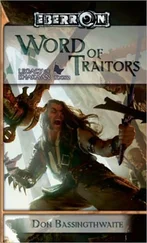Don Bassingthwaite - The Killing Song
Здесь есть возможность читать онлайн «Don Bassingthwaite - The Killing Song» весь текст электронной книги совершенно бесплатно (целиком полную версию без сокращений). В некоторых случаях можно слушать аудио, скачать через торрент в формате fb2 и присутствует краткое содержание. Год выпуска: 2006, ISBN: 2006, Издательство: Wizards of the Coast, Жанр: Фэнтези, на английском языке. Описание произведения, (предисловие) а так же отзывы посетителей доступны на портале библиотеки ЛибКат.
- Название:The Killing Song
- Автор:
- Издательство:Wizards of the Coast
- Жанр:
- Год:2006
- ISBN:978-0-7869-5665-4
- Рейтинг книги:3 / 5. Голосов: 1
-
Избранное:Добавить в избранное
- Отзывы:
-
Ваша оценка:
- 60
- 1
- 2
- 3
- 4
- 5
The Killing Song: краткое содержание, описание и аннотация
Предлагаем к чтению аннотацию, описание, краткое содержание или предисловие (зависит от того, что написал сам автор книги «The Killing Song»). Если вы не нашли необходимую информацию о книге — напишите в комментариях, мы постараемся отыскать её.
The Killing Song — читать онлайн бесплатно полную книгу (весь текст) целиком
Ниже представлен текст книги, разбитый по страницам. Система сохранения места последней прочитанной страницы, позволяет с удобством читать онлайн бесплатно книгу «The Killing Song», без необходимости каждый раз заново искать на чём Вы остановились. Поставьте закладку, и сможете в любой момент перейти на страницу, на которой закончили чтение.
Интервал:
Закладка:
Singe breathed in her ear. “Do you feel Dah’mir’s presence?”
In their other encounters with the dragon, Dandra had felt his dominating presence tugging at the edge of her consciousness before she’d actually seen him. This time, though, she felt nothing. “No,” she answered, “but that could be because Ashi’s dragonmark protects me.”
She stepped off the air and, staying low, moved cautiously forward until she could look over the low rail that surrounded the box and see down into the ring below. Her breath caught in her teeth.
That light that danced around the arena came from cold fire that burned on several stout posts set into the floor of the arena. The stench of decay that filled the air came from five bodies that lay within the circle. Dandra looked away, forced air into her lungs, and made herself look back again.
The arena floor was covered in sand. At one end, in the twilight beyond the torches’ glow, the sand lay in rolls and billows as if it had been scraped up and pushed around to make a bed for some huge creature-almost certainly Dah’mir in his dragon form. At the other end, lay the bodies, and the sand around them had been washed as smooth as a beach at water’s edge-except instead of water, it had been blood and other fluids that had smoothed the sand. Three of the bodies lay together, and two of those showed the most advanced decay. Both had bloated, and one had burst, then liquefied so that its blackened tissues spread out as if running off its bones. By contrast, the third body in the cluster was emaciated, pale, and stiff. From above, Dandra couldn’t tell how he had died.
She knew the body had been a man because of his clothes. From the clothes, embroidered in distinctive patterns of metallic thread, she also knew he had been a kalashtar. The filth-crusted clothes that pinched the more decayed bodies were likewise kalashtar in design.
The other two bodies, though, were not kalashtar. One was a human, the other a dwarf, and most of the blood that soaked the sand spread out around them. Deep, dark-edged gashes crossed their throats. Their gaunt faces were waxy and sunken, but they hadn’t bloated yet-they hadn’t been dead as long as the kalashtar. Flies flew around all of the bodies and across the blood-stained sand in clouds thick as smoke. Dandra could hear the hum of them from where she stood.
The flies also circled a long work table that had been set on the sand just behind where the human and the dwarf lay, but they found far less of interest there and didn’t linger. Dandra’s gaze darted over the myriad things that littered the table: tools, clamps, smooth pieces of wood that might have been models or forms of some kind, partly used spools of bright gold wire, a vessel containing thin plates a handspan long of the same metal, another vessel of clear crystal baubles. A heavy brazier, as cold and lifeless as the corpses, stood nearby. Along the sides of the table and from the table to the brazier, the sand had been trodden into a hard-packed path. The feet of the dwarf and the human still lay on it.
Singe had joined her at the rail. Dandra felt him tense. “Twelve moons,” he said. “Look-on the end of the table. Do you see that?”
She saw. It was a box of dull gray metal, unadorned and unassuming, but she knew that box. It was the box that had been hidden for thousands of years inside the Grieving Tree of Taruuzh Kraat. It was the box with which Dah’mir and Vennet had fled the ancient Dhakaani stronghold.
It was the box that contained-or at least had contained-the black binding stones that Dah’mir would turn against the kalashtar.
“Light of il-Yannah,” Dandra swore softly. “He wouldn’t have just left the stones out in the open, would he?”
“Most people don’t just leave bodies rotting in the open either.”
Dandra looked around the arena again. Except for the flies, there was no sign of movement or life. There was no sign of Dah’mir in any of his forms. Her eyes went back to the box, then to the bodies on the sand. “We need to have a closer look,” she said.
Singe nodded agreement and jammed the torch he carried into a crevice in the rail around the box, a marker in the darkness. There were shadowed gates below-most closed, at least one ajar-opening onto the floor of the arena, but to reach whatever passages led to them, they would have had to find their way through the arena’s innards. At the end of the box seats, however, the rail was low and easily crossed, giving them access to the regular seats and to stairs among the benches that led toward the arena floor. The stairs ended at a wall around the ring that left a fair drop to the sand below. Dandra paused at the wall, took another careful look around, then swung herself over and dropped to the floor. Her feet touched the sand for only a moment before she pushed off to remain floating above it, her spear at the ready. When Singe was down as well, they moved forward together. Up close, the humming of the flies was a loud drone.
The bodies of the human and the dwarf were closest, and they paused by them first. In spite of the decay that had set in, the hands of both were clearly bruised, nicked, and burned as if from many hours of careful labor. Many, many hours to judge by the path worn into the sand. Even in death, their fingers were gnarled, marked for eternity with dents the exact size of the wire on the table. Their legs had been shackled with a length of chain, enough to have permitted them to walk awkwardly, but not to run. “They were prisoners,” Dandra guessed. “Dah’mir had them working on something.”
“Their clothes are good,” Singe said. “Too good for Malleon’s Gate.” He looked at the tools and materials on the table and the muscles of his jaw tightened. “I think they were goldsmiths, probably from the upper city.”
“What do you think they were doing?”
Singe stepped in silence over to the metal box, examined it for a moment, and opened the lid.
When Vennet had seized the box in Taruuzh Kraat and opened it, only Geth had been in a position to get a good look inside. Dandra had touched his mind with kesh , though, and he’d shared what he’d seen. As if she’d seen it herself, the memory of twenty blue-black dragonshards, each no bigger than a finger and wrapped in a filigree of gold, shining against ancient, crumbling red fabric, had been burned into her mind.
The red fabric was gone from the box now and the individual binding stones replaced with neatly stacked creations of twisted gold. Singe drew one out and held it up. Plates and wires of gold, interspersed with clear crystals, had been fashioned into a sort of bracer, a long cuff to fit around the forearm. In a way, it was beautiful-and also sinister. Mounted on the bracer, fastened within a cage of gold, was one of the binding stones. Just as she had when Vennet had first held up one of the ancient stones, Dandra felt a chill pass through her at the sight of it. She could feel the stone like a void on the edge of her awareness. She took a step back, but couldn’t take her eyes off the golden bracer.
The swirls of metal and crystal reminded her of something else, of the great device Dah’mir had used beneath the Bonetree mound to exchange the minds of Tetkashtai, Medalashana, and Virikhad with those of their psicrystals, the first step in recreating them as servants of the Master of Silence. The bracers were so much smaller than that device, though-but then the binding stone that Dah’mir had used in the device had been a larger, weaker imitation of Taruuzh’s stones. Dandra swallowed as an idea came to her.
“Singe, is there a place where a second stone could be set?” she asked.
The wizard inspected the bracer and nodded, then looked into the box and frowned. “There are no more binding stones, though,” he said. “They’re all set in bracers already.”
Читать дальшеИнтервал:
Закладка:
Похожие книги на «The Killing Song»
Представляем Вашему вниманию похожие книги на «The Killing Song» списком для выбора. Мы отобрали схожую по названию и смыслу литературу в надежде предоставить читателям больше вариантов отыскать новые, интересные, ещё непрочитанные произведения.
Обсуждение, отзывы о книге «The Killing Song» и просто собственные мнения читателей. Оставьте ваши комментарии, напишите, что Вы думаете о произведении, его смысле или главных героях. Укажите что конкретно понравилось, а что нет, и почему Вы так считаете.
